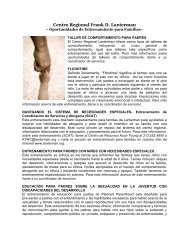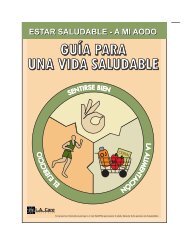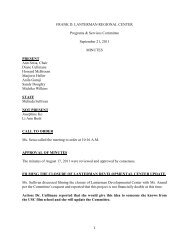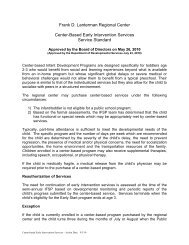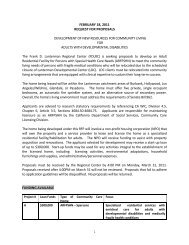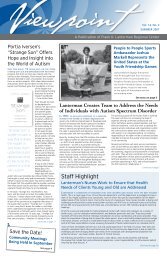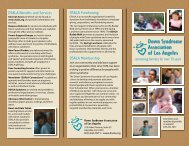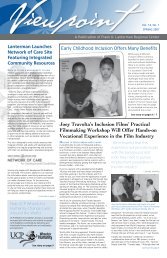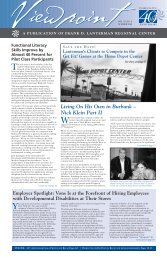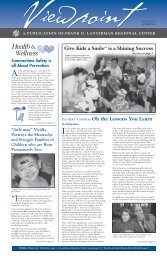Guide to Lanterman for Early Start Families - Frank D. Lanterman ...
Guide to Lanterman for Early Start Families - Frank D. Lanterman ...
Guide to Lanterman for Early Start Families - Frank D. Lanterman ...
Create successful ePaper yourself
Turn your PDF publications into a flip-book with our unique Google optimized e-Paper software.
Working Together in Partnership<br />
The <strong>Lanterman</strong> community includes our clients and their families,<br />
service providers, staff and the broader community in our geographic<br />
area, including other local and state agencies. In order <strong>for</strong> this partnership<br />
<strong>to</strong> be successful, all community members must actively participate and<br />
work collaboratively, while respecting individual roles and contributions.<br />
As the primary source of care and support <strong>for</strong> the child with a disability,<br />
the family occupies a leadership role in this partnership.<br />
Partnering with Your Service Coordina<strong>to</strong>r<br />
Your primary partner at the Regional Center is your service<br />
coordina<strong>to</strong>r. He or she is a professional with experience in the areas<br />
of child development and developmental disabilities, and knowledge<br />
about services, supports and other resources.<br />
The Regional Center assigns service coordina<strong>to</strong>rs <strong>to</strong> families at the time<br />
of intake. Whenever possible, service coordina<strong>to</strong>rs are matched with<br />
families based on primary language needs. While every ef<strong>for</strong>t is made<br />
<strong>to</strong> ensure continuity <strong>for</strong> families with their assigned service coordina<strong>to</strong>r,<br />
all regional center families experience an occasional change in service<br />
coordina<strong>to</strong>r associated with specific transitions or events:<br />
v If your service coordina<strong>to</strong>r leaves <strong>Lanterman</strong> or takes a new<br />
position within the Center you will be assigned a new service<br />
coordina<strong>to</strong>r.<br />
v Each year, you will be given an opportunity <strong>to</strong> <strong>for</strong>mally evaluate<br />
your service coordina<strong>to</strong>r’s per<strong>for</strong>mance and will be asked whether<br />
you wish <strong>to</strong> continue working with him or her <strong>for</strong> the coming year.<br />
v Finally, if your child continues <strong>to</strong> be eligible <strong>for</strong> regional center<br />
services after age 3, a transition will occur from <strong>Early</strong> Intervention<br />
<strong>to</strong> a service coordina<strong>to</strong>r in one of our School-Age units.<br />
If you become dissatisfied with your service coordina<strong>to</strong>r at any time,<br />
you may discuss your concerns with the <strong>Early</strong> Intervention manager.<br />
He or she may help you resolve your concerns or may assign a<br />
different service coordina<strong>to</strong>r <strong>to</strong> your child. Your service coordina<strong>to</strong>r<br />
also has the right <strong>to</strong> request a change.<br />
During times of transition, someone will always be available <strong>to</strong> help<br />
ensure that your child’s service needs are met until the new service<br />
coordina<strong>to</strong>r is assigned. If you need help during this time, call the unit<br />
that serves your child and ask <strong>to</strong> speak <strong>to</strong> the “officer of the day.”<br />
FAQs<br />
Can a child lose his or her eligibility <strong>for</strong> services?<br />
If a child is found <strong>to</strong> be eligible <strong>for</strong> <strong>Early</strong> <strong>Start</strong><br />
services, <strong>Lanterman</strong> will continue <strong>to</strong> provide him<br />
or her with services according <strong>to</strong> assessed need until<br />
the age of 3. At age 3, two decisions are made:<br />
• Whether the child will continue <strong>to</strong> be eligible <strong>for</strong><br />
regional center services, and<br />
• Whether the child will become eligible <strong>for</strong> special<br />
education services through the school district.<br />
In either case, <strong>Early</strong> <strong>Start</strong> services are terminated and<br />
the child graduates from the program.<br />
By age 3, with the help of <strong>Early</strong> <strong>Start</strong> services,<br />
nearly 70 percent of the children served by<br />
<strong>Lanterman</strong> Regional Center will have “caught up”<br />
developmentally <strong>to</strong> the point that they are no longer<br />
eligible <strong>for</strong> continuing regional center services.<br />
What happens if the child receiving services<br />
moves out of <strong>Lanterman</strong>’s area?<br />
If your family moves from <strong>Lanterman</strong>’s service<br />
area <strong>to</strong> another location in Cali<strong>for</strong>nia, services<br />
and supports will be provided <strong>to</strong> your child by the<br />
regional center that serves your new geographic<br />
area. <strong>Lanterman</strong> will transfer your child’s records<br />
<strong>to</strong> the new regional center. According <strong>to</strong> the<br />
<strong>Lanterman</strong> Act: “Whenever a [client] transfers from<br />
one regional center catchment area <strong>to</strong> another, the<br />
level and types of services and supports specified<br />
in the [client’s IFSP] shall be authorized and<br />
secured, if available, pending the development of<br />
a new [IFSP] <strong>for</strong> the [client]. If these services and<br />
supports do not exist, the regional center shall<br />
convene a meeting <strong>to</strong> develop a new [IFSP] within<br />
30 days. Prior <strong>to</strong> approval of the new [IFSP], the<br />
regional center shall provide alternative services<br />
and supports that best meet the individual program<br />
plan objectives in the least restrictive setting.”<br />
[Section 4643.5 (c)]<br />
If your family moves out of Cali<strong>for</strong>nia, your child’s<br />
service coordina<strong>to</strong>r and the KochlYoung Resource<br />
Center can help you contact the appropriate<br />
developmental services agency and locate related<br />
resources in the new state. With your written<br />
consent, the Regional Center can also transfer your<br />
child’s records <strong>to</strong> that state’s agency.<br />
<br />
<strong>Frank</strong> D. <strong>Lanterman</strong> Regional Center



